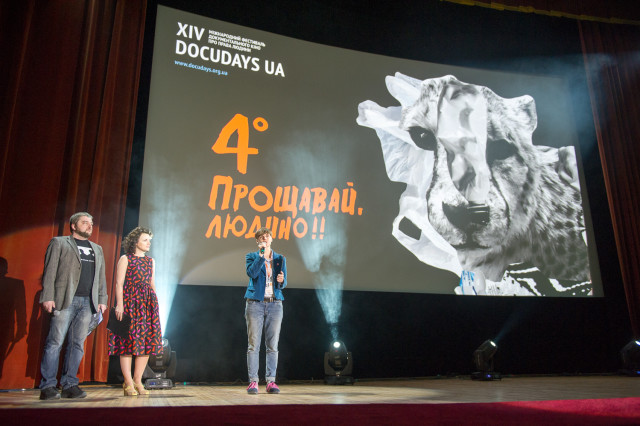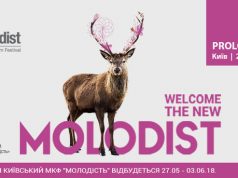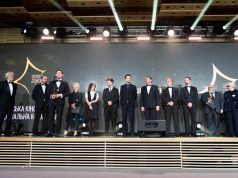
The 14th annual DocuDays human rights documentary film festival was held during the last week of March in Kyiv, presenting four competitive and four non-competitive programs to the public. The 94 films in the festival, submitted by participants from places as varied as Australia, South Korea, Canada and Iceland, demonstrated a contradictory map of the world. On the one hand, there is pain and suffering of those forced to live in the shadow of an impending apocalypse. On the other, life-affirming celebrations filled with happiness and laughter are part of everyday reality, in spite of everything. The festival’s theme “4°C. Farewell to mankind!” focused on ecological issues. Films and photo exhibitions addressed not only the problem of global warming (“The Yes Men Are Revolting,” “TuleTuvalu”), but also the “ecology” of human relations. As a re-imagining of the four horsemen of the apocalypse, the recurring themes of the festival were exploitation (“Machines,” “Demon of Sorrow”), racism (“I’m Not Your Negro”), the refugee crisis (“When Paul Came Over the Sea: Journal of an Encounter”) and violence (“Incorrect Elements,” “Storm”).
Trends and Winners of the DocuDays Competition Programs
Just as last year, the competition at DocuDays was divided into four programs: “Docu/Life,” “Docu/Ukraine,” “Docu/Rights” and “Docu/Shorts.” Instead of the expected subject of war, a number of the short films sought to make sense of the echoes of the country’s Soviet past (“Gray Horses,” “Metro,” “Coda,” “The History of the Winter Garden”) and the process of decommunization (“Leninfall,” “Alive and Unconquered”). Significantly, only two Ukrainian films touched on the war in Donbass, and then only indirectly: “See You Later!” — through the story of a romance between two young Ukrainians separated by war, and “War of the Chimerae” (in Docu/Life) — through the protagonist’s dreams about his lost comrades.
The first prize for Docu/Ukraine was awarded to Anastasia Maksimchuk for the film “Shelter.” The story of volunteers who rescue stray dogs touched both the audience and the jury. An honorable mention was awarded to Svetlana Shimko’s “Leninfall,” an informative commentary on the ideological changes in Ukraine over the past three years.
In the Docu/Life category, first prize went to Jenny Gage’s feminist picture “All This Panic,” about the secret life of teenage girls. Levan Koguashvili’s “Gogita’s New Life,” about the aspirations of a man released after 14 years in prison, earned an honorable mention.
The Docu/Shorts competition favored the most humorous films. The main prize went to Chilean film “I Am Not from Here” (dir. Giedrē Žickytē, Maite Alberdi), the sad and ironic tale of an 88-year-old resident of a senior home, whose wayward character gives her little patience for the home’s endless “groundhog day” routine. Special prize was won by Nikola Ilic’s “Rakijada” for its effervescent representation of a Balkan booze festival, evocative of the customs of Ukrainian village life.
The winner in the Docu/Rights category was “When Paul Came Over the Sea: Journal of an Encounter” by German director Jacob Proiss. Together with the charismatic and cheerful hero of the film, Proiss surmounts the difficult path of migration from Cameroon to Germany, becoming true friends along the way. The special prize was awarded to the film “Return” by Zahavi Sanjavi, a story about compassion and mutual assistance in a Kurdish refugee camp.
The audience’s choice award went to Gayana Petrosyan’s “Born to Be Free,” a film about cruel practices in the hunting of marine mammals.
Innovations
Realizing that long stretches of viewing emotionally taxing material can be difficult for the audience, the festival’s curators also planned uplifting content in the customary categories. The sunny “Docu/Youth,” humanistic “Docu/Life,” picturesque and musical “Docu/Art” were all imbued with a love for art and humankind. The festival continually strives to reduce the distance between audiences and filmmakers. A new tradition was inaugurated this year — “coffee with directors.” Now anyone who is interested may pose questions to the competition’s participants in an informal setting. The “Docu/Class” program continued as well, where visitors could chat with two titans of documentary cinema, Sergei Bukovsky and Pavel Lozinsky. These events are very important for the development of filmmaking in Ukraine — those who attend lectures and talks often return as participants to the festival in the following year.
In addition, DocuDays is an open film studio. This year saw the addition of “Docu/Pro,” a special platform for filmmaking professionals. American and European experts advised participants on obtaining international funding and creating successful promotional campaigns. The program also offered three opportunities to pitch projects, with cash awards to finance documentaries in various stages of development.
New Non-Competition Events
DocuDays 2017 featured as many as 7 exclusive new events. The most anticipated film falling within the “4°C” ecological theme was “Demon of Sorrow” by Liang Zhao. The director skillfully interwove a portrayal of the hellish labor of miners with allegories from Dante’s “Divine Comedy.” The “Homo Science” event demonstrated the high quality of popular science documentaries, among which was the most recent Werner Herzog film, “Lo and Behold: Reveries of the Connected World.” Other special events included “Generation C” films, dedicated to a critique of consumer society; “Doc on Ice” for those who enjoy Scandinavian cinema; “Image of the City,” inspired by the civic actions of ordinary citizens who fight to preserve the heritage of their cities; and the feminist collection “Three Things I Don’t Know About Her.”
The strongest non-competition event, “Masters,” presented a number of new films by eminent classic directors: Glawogger, Bukovsky, Stonys, Lozinsky and Janek. The festival’s most “political” film was “The Trial: The State of Russia vs Oleg Sentsov,” directed by Askold Kurov. The film conveys the Kafkaesque horror and absurdity of the well-known case.
The most positive and anticipated Ukrainian premiere was Roman Bondarchuk’s “Dixie Land,” which was screened at the Docu/Youth event. Faced with the death of their teacher Simyon Rivkin, the young musicians of the jazz band “Dixie Land” are forced to make their first adult choices. The film blends the sunny heightened reality of Fellini, jazz and the salty breezes of the Black Sea, taking its viewers on an hour-long journey back into childhood, while Maestro Rivkin’s example gives us hope that humanity can leave behind something more than just a pile of fossilized trash.
Iryna Nevinchanaya is a journalist based in Kyiv.



































